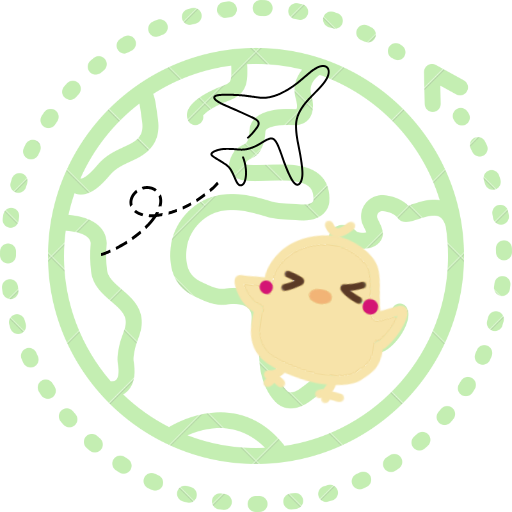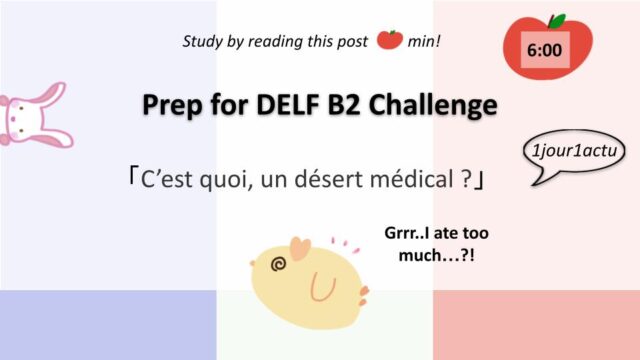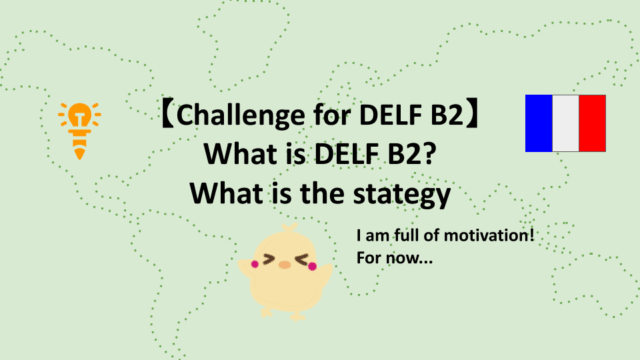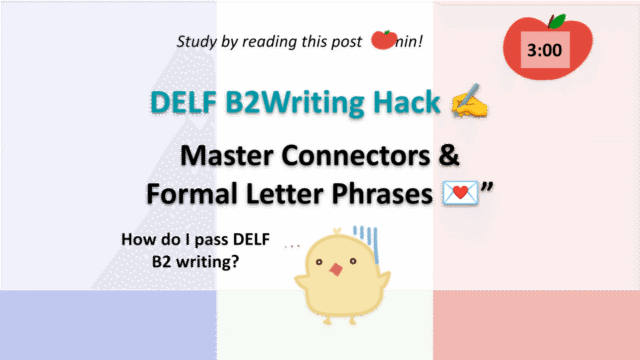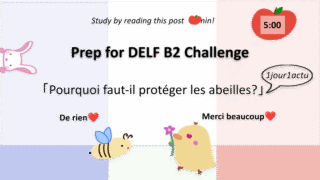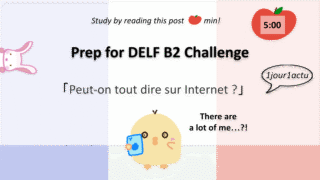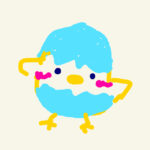【DELF B2 Prep】🔬What Is the Purpose of Science?
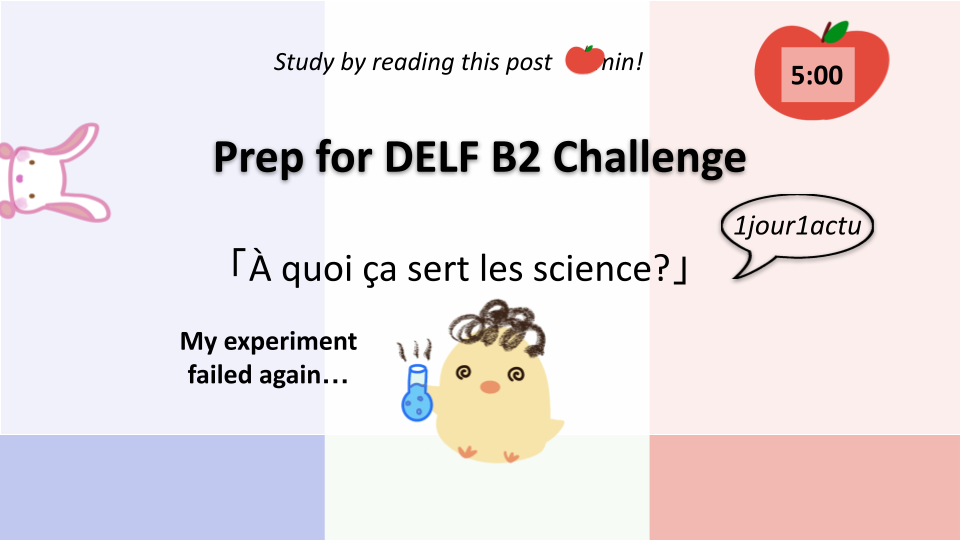
This post is 5 minutes read time. Aiming for studying by just reading!
My DELF B2 Preparation Blog – Listening & Writing Practice
Learning French Through Real Topics: À quoi ça sert les sciences ?– 1jour1actu
Science explains both the tiniest microbes and the vastness of space. But what exactly is science? In this 1jour1actu article, we discover the role of science in society, how it works, and why it’s essential. For DELF B2 learners, this article is perfect: you’ll pick up key expressions, grammar points, and essay-writing structures.
📌Today’s Key Sentence|Let’s read and understand the original
Ils réalisent des expériences pour tester ces hypothèses jusqu’à ce qu’ils trouvent la bonne réponse, celle qui se vérifie encore et encore.
Translation 👉 :
They carry out experiments to test these hypotheses until they find the right answer, the one that can be verified again and again.
🔍 Vocabulary & Grammar Breakdown
| French | English Translation | Explanation |
|---|---|---|
| Ils réalisent des expériences | They carry out experiments | réaliser = to carry out, formal and academic usage |
| pour tester ces hypothèses | to test these hypotheses | hypothèse = a scientific guess or theory |
| jusqu’à ce qu’ils trouvent | until they find | Requires subjonctif after jusqu’à ce que |
| la bonne réponse | the correct answer | Standard phrase for “the right solution” |
| celle qui se vérifie encore et encore | the one that can be verified again and again | celle qui = relative pronoun referring to the correct answer |
📚Vocabulary Boost
| Expression | Meaning | Notes |
|---|---|---|
| connaissance | knowledge | From connaître; core goal of science |
| observer | to observe | Used in scientific observation |
| hypothèse | hypothesis | Often with formuler or tester |
| expérience | experiment | Not to be confused with avoir de l’expérience (life experience) |
| vérifier | to verify | For checking results, theories, or data |
| se partager | to be shared | Passive structure; used in scientific discoveries |
| démarche scientifique | scientific method | Full research process: observe → hypothesize → test |
| idée reçue | common misconception | Opposed to proven knowledge; useful in argumentative writing |
| phénomène | phenomenon | Natural or social events; useful in science or philosophy topics |
| enquêter | to investigate | Used with sur or faire une enquête |
| progrès technologique | technological progress | Refers to innovations like satellites, vaccines, etc. |
🔧 Grammar Focus | Key Structures for B2
Structure: jusqu’à ce que + subjonctif
Meaning: Until something (uncertain/future) happens
Use in writing: Use it to show goals or future results that haven’t occurred yet.
✅ Je travaille jusqu’à ce que je comprenne tout.
➝ I work until I understand everything.
🎁 Bonus Grammar Insight|se servir de
Structure: se servir de + noun
Meaning: to use something / to make use of something
Use in writing: A slightly idiomatic way to say “utiliser”, commonly used in both written and spoken French. Very useful in academic or argumentative writing when describing tools, methods, or data.
| Example (French) | English Translation |
|---|---|
| Les scientifiques se servent d’expériences pour tester leurs hypothèses. | Scientists use experiments to test their hypotheses. |
| Je me sers de mon ordinateur pour écrire mon mémoire. | I use my computer to write my thesis. |
| On se sert souvent des statistiques pour analyser les résultats. | We often use statistics to analyze results. |
🧠 Grammar Tip:
- Can be used instead of utiliser for more natural French.
- This is a reflexive verb, so always conjugate with reflexive pronouns: je me sers, tu te sers, il/elle se sert, nous nous servons…
📘 Essay Expressions | Ready-to-Use Phrases
| French Expression | Example in French | English Translation |
|---|---|---|
| Il est important de comprendre que… | Il est important de comprendre que la science repose sur des faits prouvés. | It is important to understand that science is based on proven facts. |
| Cela permet de… | La méthode scientifique permet de mieux comprendre le monde. | This allows us to better understand the world. |
| Contrairement à… | Contrairement aux idées reçues, les microbes ne sont pas tous dangereux. | Unlike common beliefs, microbes are not all dangerous. |
🖋️ Practice Writing | Short Essay Prompt
Sujet :
Penses-tu que les sciences sont indispensables à notre société ? Pourquoi ?
(Do you think science is essential to our society? Why?)
Model Answer:
🔹 Introduction
Les sciences occupent une place importante dans notre quotidien, mais sont-elles vraiment indispensables à la société ?🔹Développement 1
D’une part, elles permettent de faire des découvertes utiles comme les vaccins ou les satellites, ce qui améliore notre vie quotidienne.🔹Développement 2
D’autre part, les sciences nous aident à comprendre le monde et à lutter contre les idées fausses, grâce à une démarche rigoureuse.🔹Conclusion
En conclusion, les sciences sont non seulement utiles, mais également essentielles pour le progrès et la compréhension du monde.
Translation:
Introduction
Science plays a major role in our daily lives, but is it truly essential to society?
Body 1
On one hand, it allows for useful discoveries like vaccines or satellites, improving our lives.
Body 2
On the other hand, it helps us understand the world and fight misinformation using a strict method.
Conclusion
In conclusion, science is not only useful but essential for progress and understanding.
✅ Test Yourself | Final Quiz
Q1. Que signifie « démarche scientifique » ?
a) Une croyance ancienne
b) Une méthode pour prouver des hypothèses
c) Un progrès technique
Q2. Complète la phrase avec le bon subjonctif :
Je continue à chercher jusqu’à ce que je ___ (trouver) la réponse.
Q3.Lequel de ces mots signifie « idée fausse répandue » ?
a) Hypothèse
b) Idée reçue
c) Théorie
Answer
- b) Une méthode pour prouver des hypothèses
- trouve
- Idée reçue
